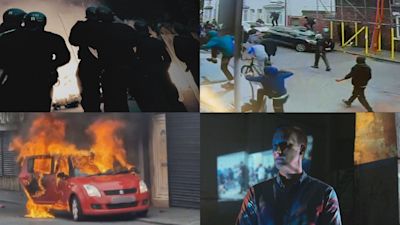Exclusive
Exclusive data shows 327% rise in far-right activity during summer riots

The research, shared exclusively with ITV News, found the name most commonly mentioned in the groups was Tommy Robinson, UK Editor Paul Brand reports
Like all shop owners, Parvez Akhtar takes measures to protect his stock in Middlesbrough.
But the barbed wire he showed us at his mobile repairs store is also there to protect his family.
Never before has he feared so much for their safety after a mob of rioters came knocking on his street, and worse, last month.
“One guy got a hammer and smashed my door window and my main window,” he told us.
In footage never broadcast before, a video he shared with ITV News shows a crowd targeting vehicles and homes at random.
“Lads jumped on my car, they damaged my car, bonnet, screen, roof, windows, everything," Mr Akhtar explains.
As they set fire to other vehicles nearby, he was forced to hide upstairs with his young children.
“My 11 year-old son was holding my hand, he said to me ‘dad, save me, save me.’ I said, ‘don't worry, they won’t come in’, but I'm scared myself. We thought maybe they’d come inside and kill us. We heard that they were looking for Asian people.”
Six weeks on from the riots, the Tonight programme has been analysing the online activity that inspired the offline violence that terrified families like Mr Akhtar's.
New data shared with us shows the extraordinary rise in far-right traffic on social media.
On Telegram, activity surged in the 48 hours after the Southport attack, in which three young girls were killed.
The volume of messages in extremist groups shot up by 87%. And in the following days, the momentum only built.
By day ten, far-right activity on Telegram had surged by 327%.
Subscribe free to our weekly newsletter for exclusive and original coverage from ITV News. Direct to your inbox every Friday morning.
The research, shared exclusively with us by the Institute for Strategic Dialogue, found the name most commonly mentioned in the groups was Tommy Robinson.
As a former leader of the now defunct English Defence League (EDL), it is little wonder he was the subject of so much chatter.
Tonight can share that his posts on X, formerly Twitter, received 434 million views over the course of the rioting.
We spoke to one of Robinson’s former comrades, Ivan Humble, who has the letters EDL tattooed on his right arm, but now works to counter the views he once held.
As a former regional organiser for the far-right group, he told us online platforms are radicalising minds at a terrifying rate.
“You’re always seeing stories posted in there that nobody challenges, because the minute somebody challenges the mindset of the group you’re kicked out of the group and blocked.
"Telegram is probably one of the worst ones at the minute because it’s encrypted. But any platform that you can form a group on, it will become an echo chamber.”
But how did the hatred jump from social media, to inspire antisocial mobs? Tonight has been analysing the police response before and during the riots.
Thousands of officers put their safety on the line during the unrest, but some believe they wouldn’t have had to if more action had been taken earlier to counter the threat of the far-right.
For several years, there have been warnings about the rise of far right extremism, which we encountered at ITV News in 2021 when we were allowed to film on the terrorist wings of two prisons.
And yet some believe the police have not taken the threat seriously enough.
Former superintendent at the Metropolitan Police, Leroy Logan, told me: “I think when it comes to these riots, they haven't taken the far right seriously enough for a number of years.
"So they haven't devoted the assets to infiltrate, to really understand the scale of it. I think they do now. Infiltration is critical. But I don't think the infiltration that they should have had was there.”
The National Police Chiefs Council told ITV News in response: "We are committed to tackling any and all ideologies which pose a threat to the public’s safety and security, and treat the threat from the far right in exactly the same way as any other toxic ideology used to spread mistrust and fear in our communities...The policing response to the recent disorder and rioting was swift, robust and thorough”
Telegram said: “There is no place for calls to violence on Telegram. Moderators removed UK channels calling for violence when they were discovered, including Southport Wake Up and Enough is Enough. Each day, moderators remove millions of pieces of harmful content.
“A sharp increase in Telegram’s user numbers to almost a billion caused certain growing pains in content moderation, which we are currently addressing – improving this is Telegram's main goal for 2024.”
But while this summer’s riots are over, the online activity that helped drive the offline criminality still risks a repeat. You can watch the full programme, The Summer Riots: Burning Britain - Tonight, on ITV and ITVX at 8.30pm on Thursday, September 12.
Want a quick and expert briefing on the biggest news stories? Listen to our latest podcasts to find out What You Need To Know...